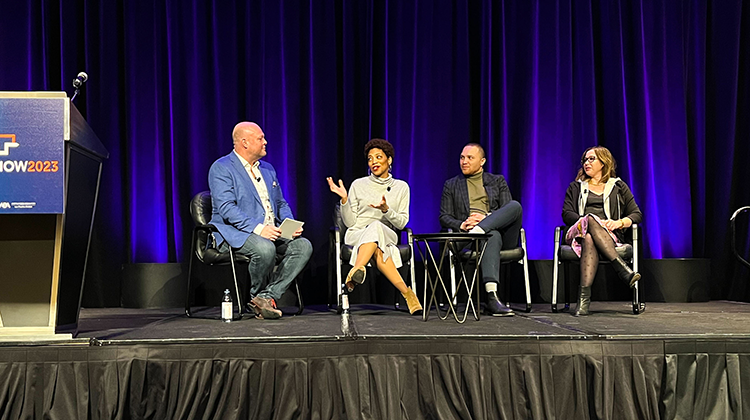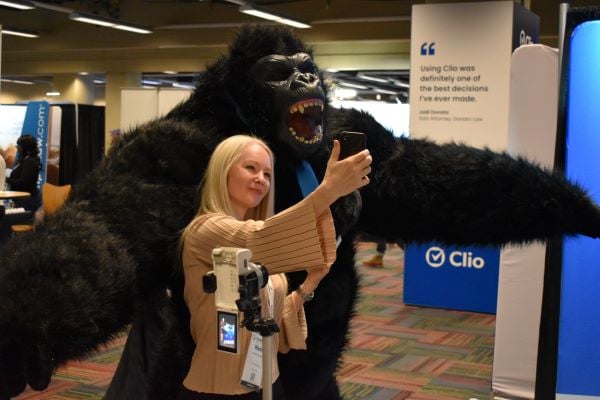Techshow keynote panel tackles ChatGPT and startup challenges

Jack Newton of Clio (from left), Kimberly Y. Bennett of Fidu, Jazz Hampton of TurnSignl, and Erin Levine of Hello Divorce were the panelists at the ABA Techshow opening keynote address. Photo courtesy of Clio.
ABA Techshow 2023 kicked off Thursday with an opening keynote panel that featured four legal tech experts weighing in on topics as wide-ranging as the billable hour, the challenges of launching a startup and ChatGPT.
Clio’s founder and CEO Jack Newton moderated the Legaltech Visionaries Panel on Thursday morning at the Hyatt Regency Chicago, the first of two keynote panels at this year’s show.
Before introducing the panelists, Newton recalled how Clio got its start at Techshow 15 years earlier. At that point, the company was just a scrappy startup and had spent its last $5,000 to come to the show, according to Newton. Renting a computer from Techshow was a pricey proposition, so Newton and Clio co-founder Rian Gauvreau went to an Apple store and bought an iMac before returning it at the end of the show. His excuse for returning the computer? The “W” key didn’t work. Apple offered him a new keyboard but Newton declined.
“I said, ‘No, I’m sorry. I’m ruined on your brand,’” Newton said to laughter.
During the one-hour panel discussion, Newton discussed the future of legal tech and law practice with Erin Levine of the online divorce platform Hello Divorce (Legal Rebel ‘22), trademark and business strategy attorney and Fidu co-founder Kimberly Y. Bennett, and Jazz Hampton, the CEO and general counsel of the Minnesota-based tech company TurnSignl, which won the Startup Alley pitch competition at last year’s Techshow.
Follow along with the ABA Journal’s coverage of the ABA Techshow 2023 here.
If there was one piece of tech on everyone’s mind ahead of this year’s event, it was OpenAI’s chatbot, ChatGPT. The panel discussed how the platform—which offers human-like responses to user prompts—will impact the legal industry.
“ChatGPT is not going to replace us,” Levine said. “It’s going to make us look like superheroes.”
Though the new tech has dazzled millions, its creators have warned it should not be relied on for anything important. ChatGPT cannot currently ask users clarifying or follow-up questions. Furthermore, OpenAI says the tech may respond with inaccurate or biased responses based on the vast but dated internet dataset used to train it.
But Hampton said that he is already using the tech as a drafting tool for LinkedIn posts, and he had been playing with ChatGPT on Wednesday night, prompting it to write a summary judgment motion in a federal district court in Illinois. He said ChatGPT responded with an outline. Hampton then prompted it again and it responded with a citation and federal code.
“It’s such an innovative way to just get more information quickly as a launching point for what you can do—not to draft your motion. Don’t do that yet,” Hampton warned.
The panelists touched on how the legal industry should embrace innovation to move forward or risk being left behind, and should also consider moving away from old modes of working, including the billable hour.
“I think the billable hour is probably one of the biggest impediments to our growth as an industry and as a profession,” said Bennett, who has long touted subscription-based plans for law firms.
Newton also asked the panelists about some of the challenges they faced as they got their startups off the ground.
Hampton was working full-time when he started TurnSignl, which offers real-time attorney advice to people during traffic stops. He says that when he started the company, he had to pull his kids out of daycare and decide whether or not to lay off an employee or stop paying himself.
“The highs are incredibly high and the lows are really low,” Hampton said.
Levine said she made some tough decisions about whether to restructure Hello Divorce to attract outside investment and hire employees who were willing to work for lower wages in exchange for stock or an interest in the company.
“In startup land, every day feels like you’re five minutes to a billion-dollar success and five minutes away from everything just blowing up,” Levine said.
Bennett added that launching a startup requires getting used to people saying “no” or even telling you that your idea won’t work. Her company Fidu is a platform for delivering subscription legal services.
“You have to have a thick enough skin to take it and then to keep moving forward and not worry about it,” she said.
This year’s Techshow runs until Saturday, March 4. A final keynote panel Friday at 8:45 a.m. is a debate about relaxing the ABA Model Rules of Professional Conduct. Jayne R. Reardon, former executive director of the Illinois Supreme Court Commission on Professionalism, is moderating.




